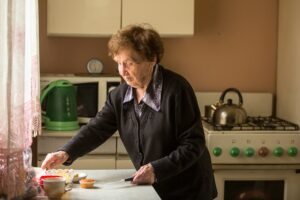
Taking care of a senior is never easy, especially when they choose to age in place. You may have to go over to their house regularly or even hire elder care to take shifts with you or be there part time to help them. Regardless of your situation and your seniors’ living situation, there are some hazards in the kitchen that pose a huge threat to your loved ones’ safety. Here are a few things you should look for when it comes to hazards in the kitchen that can endanger your senior.
Unreachable Cabinets Can Pose a Threat
Although floor-to-ceiling cabinets are a great way to increase storage capacity, they pose a serious risk of injury to elderly people who make an effort to access items on the upper shelves. Put the plates, silverware, and cooking implements that you use most often within easy reach. Make sure your loved one has a stable footstool with arm rests so they can reach the upper shelves. It is crucial to go through the kitchen to ensure everything they are using is safe and easily accessible.
Slippery Floors Are Dangerous
Seniors are more prone to falling and can suffer serious injuries, especially if they have osteoporosis or other health issues. No matter who is cooking, the floor in the kitchen can easily become slippery. This poses a huge threat to your elderly loved one, who may not be as stable as they used to be. Add in non-slip mats, or have elder care keep an eye on how wet the floor gets and help them wipe up any excess water. Slipping in the kitchen can be deadly for a senior.
There Are Tons of Flammable Products in the Kitchen
Home fires often begin when something combustible comes into contact with an ignition source. Your loved one should store the cleaning supplies and aerosol cans elsewhere, preferably in a cool, dark place away from any heat sources, such as the kitchen. Your loved one should also keep cardboard boxes and other combustibles away from the stove or fireplace. If they don’t know what is flammable, help them go through their kitchen to spot any dangers. This can also be something elder care providers can help with.
Pay Attention to Lighting
The loss of peripheral vision is a common consequence of aging, and it increases the risk that your loved one may injure themselves by tripping or cutting themselves while cooking. Put in lighting around the counters and use switches at each kitchen door to make sure the lights are on. Motion-activated night lights may be useful for lighting the way to the kitchen in the event that your loved one has to get up in the middle of the night to get a sip of water. If a senior is getting up in the middle of the night they should find night lights that are motion activated.
Watch for Countertop Appliances
Cooking may be a lot easier for seniors with the help of appliances like slow cookers and toaster ovens. Yet, mishaps might occur if counter space is overrun with unnecessary items. Keep the floor and the surfaces around the sink free from electrical wires. Also, to lessen the possibility of fires, have your loved one choose appliances that may be set to shut off automatically.
If you are considering elder care in Spring Branch, TX for an aging loved one, please call the caring staff at At Your Side Home Care. We will answer all of your senior care questions. Call today: (832) 271-1600.
Our Certified Nurse Aides, 24-Hour Live-in Assistants and Home Health Aides are available 24 hours a day, 365 days a year. We also provide the security and confidence of 24-hour Telephone Assistance, so fast, reliable help is always available when it's needed. To learn more about our homecare services see our homecare services page.
Different people need different levels of homecare. To meet the requirements of our clients, At Your Side Homecare maintains consistent staffing levels of caring professionals. Homecare service is available for as little as a few hours a week, or as many as 24 hours a day, seven days a week
- What Solutions Can Help Seniors with Mental Health Challenges? - April 18, 2025
- How Does Senior Home Care Help Make Aging in Place Possible? - April 11, 2025
- Best Balance Exercises for Seniors - April 4, 2025



